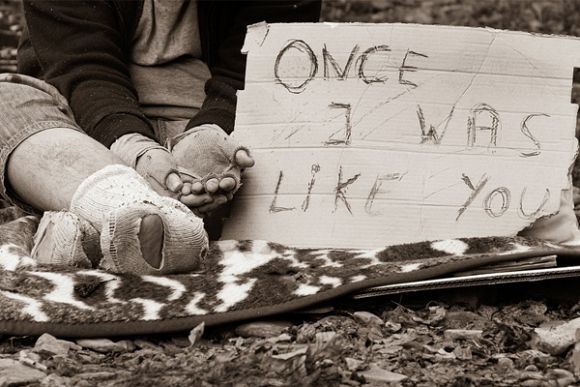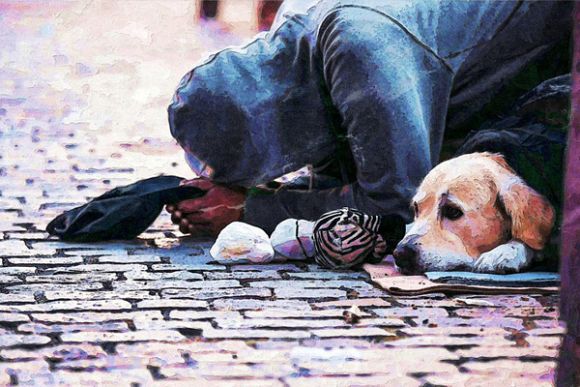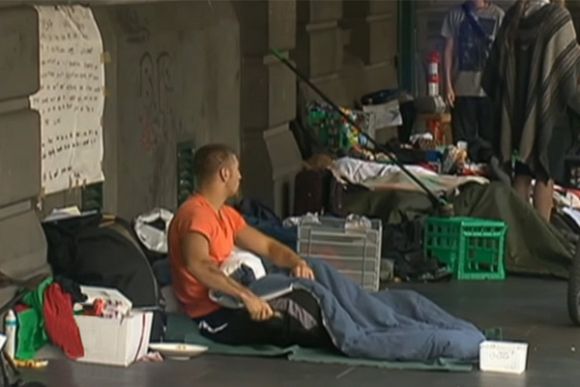Rather than marginalising the homeless, governments must start taking steps to ensure their health and wellbeing, writes Gerry Georgatos.
A CRY from the alleyways, verge squats and lonely parks. The scale of homelessness is abominable in Western Australia, where otherwise the privileged enjoy life in our nation’s wealthiest jurisdiction.
Most recently, the Western Australian Government, with an election looming, overreacted and called in police to close down the Fremantle homeless camp. This was after a media blitz on the Government’s horrific track record on homelessness and the lack of public housing.
Life is short and it matters what we do for sisters and brothers languishing far behind the line of disadvantage.
The Fremantle camp for the homeless was what Matagarup (Heirrisson) homeless camp was. What Sydney's Glebe, Belmore Park and Martin Place homeless camps were. They foreground to Australians what otherwise for the majority is unimaginable. The Fremantle camp was safer than the streets.
The street homeless experience various violence, are robbed, are predated upon. Homeless women and youth are beaten and raped in alleyways and squats. Who hears their cries?
The sad indisputable comparator is Pioneer Park camp, with all its tragedy and travesty, was safer than the alleyways, car parks, verges, parks, squats and traps,
Last year, more than 40 homeless souls died on the streets of Perth.
It is beyond immoral reprehension the disingenuous Trump-esque meltdown by Premier Mark McGowan and the Western Australian Government to try and extinguish public empathy for the homeless by defaming the street homeless as charlatans. This cruelty has been tried before by the disgraced and sacked former Perth City Council.
What is Western Australia becoming when the Premier and ministers lower themselves to a misinformation campaign to cover up their penny-pinching ways concerning the homeless?
Western Australia fails the homeless and vulnerable worse than any other State. It has one of the highest homeless rates in the nation.
Yet, Western Australia is proportionally the richest state in the world’s 13th biggest economy. To permanently house all the State’s street homeless, the most vulnerable, will cost much less than one standalone state budget surplus. To end all forms of homelessness in this State, by building 16,000 quality public, social and community houses, could cost between five billion dollars to no more than eight billion. This spend could be recovered within two years of State budget surpluses.
It will also reduce the burden of preventable disease and poor health and reduce the ancillary homeless service support costs.
Western Australia can inspire the nation, go from the nation’s backwater to a social justice giant and end street homelessness if the political will exists. In 2011, the now Premier, then Opposition Housing Shadow Minister, stood next to me at a rally for the homeless. And for a call for public housing. Shadow leader, Eric Ripper and present-day Greens parliamentarian, Alison Xamon, were also speakers at the rally.
In Opposition, Mr McGowan was one with human rights practitioners calling for more public housing and for homeless friendly precincts. As Premier McGowan, along with some of his Ministers – not all – he is heralding a never-before-seen assault on human rights practitioners. Who would have believed? I first met Mark, nearly two decades ago, through soup kitchens and food banks we were both involved with.
Earlier last year, during the first wave of our State’s lockdowns, our small service, the National Suicide Prevention & Trauma Recovery Project, accommodated more homeless than our Government did. They put up in a hotel, 20. We put up 43. They’re a Government, we’re not.
This past weekend, a suicidal young woman – homeless and drug-affected – cried out for help. We responded, calling an ambulance which turned up to a Perth city park with police. Unbelievably, a little while later, she was discharged from hospital.
She cried out for help once again and she was violent and abusive. But we managed to get her into hotel accommodation, to come down from the drugs. For our thanks, the other responder was punched. Had we not intervened, she might have more than likely been another street homeless death.
Here is an edited support letter I wrote to a Department of Housing Office in Perth in hoping to secure a home for this young woman:
Kelly* must be prioritised for a home, without delay. Her very life depends on this. Her suicidality will be significantly mitigated with housing security. The firmament of a home will stalwart steady her and order her thinking, allowing her innate high calibre intellectuality to pronounce her best self.
If the housing waiting lists were triaged on a need basis, Kelly would be at the top of the list. The expeditious housing of Kelly may save her life.
Kelly is presently either street homeless or at best transient, from one dire predicament to another. Kelly’s high calibre cognitive processing has been cast a dark pall after bouts of street homelessness narrated by a staggeringly harrowing life journey multilayered by traumas – aggressive trauma, multiple traumas and compositive traumas – she is the victim of various violence, sexual abuse, deprivations, never having the chances to a best life the majority of Australians take for granted.
I have worked with thousands of people over the years, and there are few journeys as harrowing as Kelly's. The multifactorial traumas Kelly endured should be unimaginable. She has taken blow after blow, and then more, and all the while fighting like no other person I know to survive and at times to thrive.
Kelly has miraculously survived because so far, she has been this extraordinarily resilient individual. I have the upmost respect for Kelly and in all my remaining days on this earth I will never forget her – and her perennial drive to live for something better despite the midst of wickedness, horrors imposed on her – and beautifully shine a light in pursuit to improve her lot.
Will she survive without a home? I do not believe so. The home is what may save her life, and if kindly secured, we at the National Suicide Prevention & Trauma Recovery Project will do everything we can, including furnishing the home.
Kelly will have the psychosocial supports of myself and also from the salt-of-earth Daydawn Advocacy Centre. Kelly is also visiting counsellors at Yorghum and we will work to care plan in diverse supports.
On completing her sentence at the correctional, Kelly was transferred to another interstate women’s correctional where she was to complete another sentence. Her mother became terminally ill. I assisted in securing Kelly’s Compassionate Release November 2019. During that time, she lived in another city in community social housing.
Kelly had also not seen her four children in two and half years. They live in a Queensland coastal community. I assisted Kelly in spending a week with them. This was profound validation of a mother’s love, despite the battles she has, and the profound validation of the love her children have for a mother unfairly treated by life.
The death of Kelly’s mother to cancer, aged in her fifties, was devastating for the family but I assisted to journey Kelly from interstate to Perth.
The individual I know, introduces me to one seriously at-risk individual after another – to family and friends, to people she has just met. She is wonderfully kind-hearted individual, a carer to others despite her personal predicaments, at times dire.
The above are only snippets of Kelly’s life and reasons to triage to prioritisation. Kelly will not be alone: she will have many supporters and networks. There will be a safety net but the Kelly I know, once housed, will be houseproud and independent, and thrive.
* Kelly is a pseudonym.
Gerry Georgatos, the son of CALD migrants, is a suicide prevention and poverty researcher with an experiential focus. He has a Master in Human Rights Education and a Master in Social Justice Advocacy & Civil Rights Arbitration. He is the national coordinator of the National Suicide Prevention & Trauma Recovery Project (NSPTRP).
Related Articles
- Australia must build 150,000 public rental homes and end all forms of homelessness
- Australia’s homeless — third highest rate and street homeless deaths increasing
- How the economy contributes to the homelessness problem
- Australia needs to act on homelessness
 This work is licensed under a Creative Commons Attribution-NonCommercial-NoDerivs 3.0 Australia License
This work is licensed under a Creative Commons Attribution-NonCommercial-NoDerivs 3.0 Australia License
Support independent journalism Subscribe to IA.















